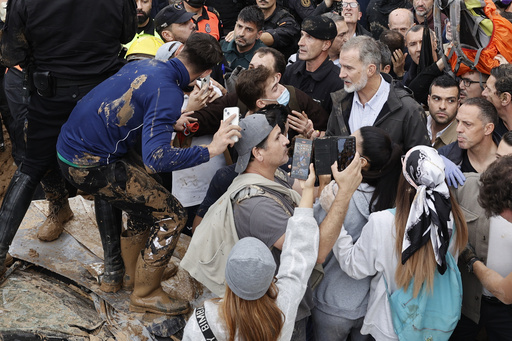
BARCELONA, Spain — As catastrophic floods wreaked havoc across Spain, mud was flung at King Felipe VI during a visit to the affected community of Paiporta, where over 60 lives were lost last week. Felipe, determined to engage with residents, bore the mess on his face and clothing, capturing an intense moment that could potentially shape the narrative of his reign.
A large crowd confronted the royal family, along with the prime minister and regional leaders, by throwing mud and other debris during their first visit to the devastated area. The tragic floods have claimed more than 200 lives in total and have left numerous communities shattered. The mud that struck the king highlighted the anger directed not just at him, but at the government’s handling of the disaster. The officials faced criticism from locals, and some suggested that far-right elements within the crowd were trying to target the Socialist prime minister.
The scene of the muddy monarch, according to Montserrat Nebrera, a constitutional law professor, could trigger a shift towards more passionate protests, as it marked an unprecedented display of public discontent towards the royal figure. Both monarchists and republicans recognized that Felipe, despite his ceremonial role, presented himself as a leader willing to face challenges head-on. The king insisted on engaging directly with residents, even as his security sought to shield him from the crowd. Queen Letizia shared in the experience, interacting with people despite the chaos.
“Felipe’s actions might be remembered as a significant moment of his reign,” commented Oriol Bartomeus, a political science expert. Had he chosen to retreat under the protection of his guards, it would have been seen as a major failure. Instead, Felipe displayed resilience and connected with the individuals affected by tragedy, marking a memorable chapter in his leadership.
At 56, King Felipe has inherited a monarchy that faced severe damage to its reputation due to scandal surrounding his father, Juan Carlos, who abdicated in 2014. Although Juan Carlos was once revered for his role in restoring democracy after Franco’s dictatorship, Felipe has often been viewed as distant. Relying on the support of Letizia, who has experience as a journalist, he has maintained a relatively modest royal household amid a climate of growing republican sentiment in the nation.
Notably, Felipe had encountered some criticism during a tribute to victims of a terrorist attack in Barcelona back in 2017, but the mud-throwing incident represented an entirely different level of hostility. Prime Minister Pedro Sánchez also faced the crowd’s disapproval, requiring swift exit with the aid of his security after being pelted with debris. The situation escalated with a bodyguard sustaining an injury, prompting a preliminary investigation into the incident.
Felipe remained on-site for over half an hour, engaging in discussions with residents, listening intently despite the challenging atmosphere. Observers remarked that he did not patronize the people but rather maintained a genuine dialogue, stepping down from the platform of royalty to address the frustrations directly.
Following this incident, Felipe participated in emergency response meetings in Valencia, joining Sánchez and other officials to assure the public that the state would address their needs post-disaster. However, according to experts like Nebrera, this involvement may create misconceptions about the king’s actual power and role, potentially positioning him as a scapegoat for the broader recovery effort.
As the king works with elected officials, there looms the perception that he wields considerable influence in managing the crisis, which could lead to further complications should responses falter. The ongoing recovery efforts in Valencia may yield difficult news, and Nebrera suggests this could reflect back on Felipe, despite his intentions to support the people.
